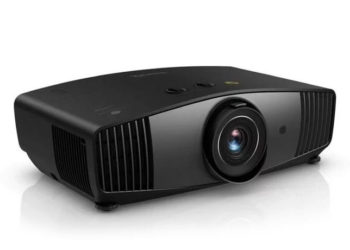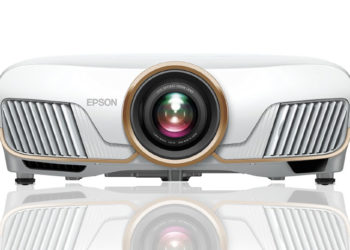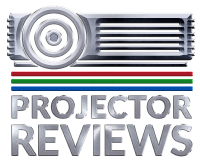Remember, for normal 1080p viewing, 1,000 lumens is enough to fill a typical 150” diagonal screen with movie theater brightness, which means the BenQ has plenty of power for your dedicated a home theater on screens up to about 125 inches diagonal and its better modes.
The Epson may be a great “home theater” projector for its price, but it is equally impressive in brighter rooms. Epson’s brightest mode (not great – it has a bit of a greenish cast) produced 3,400 lumens, blowing away its claims, per Eric who calibrated and measured both projectors. BenQ’s brightest mode pumped out only 1,400 and change lumens, but was very green, and should not be used except when under an attack of massive ambient light.
The first good-looking mode on the BenQ puts out almost 1,100 lumens. Not bad, and is definitely better looking than Epson’s brightest, but Epson serves up 2,300+ lumens with comparable color quality to the BenQ’s 1,100 lumen mode. That’s a huge difference when fighting ambient light.
I’ve discussed the different characteristics about the two projectors handling of HDR, so I should point out that the BenQ is capable of 1,300 lumens maximum, while putting HDR content up on the screen, using REC709 color. HDR can use those extra lumens. With the Epson, our REC709 calibration for HDR, was, as expected, far brighter. It had 2,300 lumens uncalibrated to work with, and 1,850 lumens after full calibration. The BenQ, manages over 1,200 lumens in REC709 when fully calibrated, so it closes the gap when both calibrated, but the Epson is still more than 50% brighter.
Both projectors have plenty of lumens in general for that proper “theater.” Our solution for both projectors – in terms of handling 4K HDR content, and P3 – was to calibrate both projectors, so that we have two calibrated 4K HDR modes: one attempting P3 color, and the second one, brighter, doing REC 709. Even in the theater however, we can use all the lumens we can find for HDR content, and for that reason, many of you may choose to pass on using P3 color in exchange for more pop up and wow factor, when watching HDR content.
If attempting P3 color and HDR – on 4K content, the Epson gets as close to nailing P3 color accurately as any lamp based projector we’ve calibrated. The BenQ has a lot more trouble. It doesn’t get very close to P3, but still better than REC709. Just keep in mind that the differences, say, between P3 color and REC 709, seems minor compared to HDR vs good old SDR (Standard Dynamic Range).
Theoretically, the BenQ has two distinct advantages in terms of sharpness. First, it does more pixel shifting, and secondly, being a single chip DLP projector, it does not have three separate LCD panels whose light it must converge. Those are the technology differences, but we are more interested in our perception of how sharp the image is, up on the screen. As mentioned elsewhere, image processing makes a real difference. Check out the images in this player where we have the full frame photos and also close-ups that can be compared between the BenQ HT5550, and the Epson Home Cinema 5050UB.
How you set the appropriate processing controls on the two projectors will determine which one seems slightly sharper to you. For all practical purposes, I consider these two projectors comparable. Perceived sharpness will not be a major deciding factor for you. By the way, from my own experience, the way I like my Epson set, it tends to appear just a touch sharper than the BenQ. I tend to push the Epson’s image processing a little harder the most, especially on things like sports viewing.





